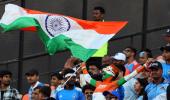
Intrigue, uncertainty, backstage drama. The ICC Champions Trophy has seen it all even before the curtains go up on the tournament and it would only get more stirring over the next three weeks, starting with the opening clash between Pakistan and New Zealand in Karachi.
Eight teams will vie for a trophy, often talked up as tougher to win than the World Cup, and also to script a new chapter in their own cricketing story. While India will fight it out in Dubai, others will be primarily based in Pakistan, which would get to host its first ICC event since the 1996 World Cup.
Several barriers had to be hurdled over to cobble this tournament together after eight years. The tournament is also crucial amid the raging debate on the relevance of ODI cricket, which is struggling to find its space amid the rage for T20 cricket and the devotion for Test format.
Perhaps, no other cricketing event in the recent past has been harried so much by long-standing geopolitical tensions, stubbornness by administrative boards of two important participants, and the nail-biting anxiety over the readiness of venues in the main hosting nation.
The chaos has been an endearing throwback to the 90s when cricket in the sub-continent resembled a hastily organised party.
But all these pre-tournament jitters will be forgotten once the teams enter the field, and the first of them will be Pakistan and New Zealand.
If anyone needs a reminder, then Pakistan had won the last edition of the Champions Trophy in 2017.
The opening match in itself is a curious clash -- a talented-yet-volatile Pakistan unsure of its own destiny against a team for which order is everything.
But the blue riband match of the tournament will be on February 23 when India take on Pakistan, ushering in customary waves of nostalgia, emotions, political grand-standing, and the social media battle.
That marquee showdown will be in Dubai as India remained steadfast in its refusal to set foot on Pakistani soil owing to security concerns.
Last dance of Kohli, Rohit?
But beyond such team equations, certain individual players would want this tournament to be a memorable one.
On top of the list are India's batting talismans Virat Kohli and Rohit Sharma. They have been magnificent servants of the game over the last decade and half.
Few in modern era were able to match their achievements and aura. But now, these two titans have reached the last lap of a long race, and would want to bow out in a blaze of glory.
It's tough to imagine Kohli and Rohit being part of India's ODI set-up after the Champions Trophy irrespective of the outcome.
It might even impact their future in Test cricket, as a lukewarm outing here might force the selectors to mull over their role ahead of India's tour to England in June.
Similarly, a failure to win the Champions Trophy will bring the role of head coach Gautam Gambhir under scrutiny.
Gambhir might have received a temporary relief after India's domination over England in the recent home series, but not it wouldn't be enough to brush under the carpet, India's recent travails against New Zealand and Australia.
But a global trophy will certainly give him a much better ground to stand.
From a team perspective, India will be eager to wrest their first ICC trophy in the 50-over format after their triumph in the 2013 Champions Trophy under the enigmatic Mahendra Singh Dhoni.
It will be a perfect parting gift to Kohli and Rohit and a welcome carpet to some young names such as Shubman Gill who are set to take India into the future.
India are playing a brand of ODI cricket that makes them instant favourites to win the tournament. They have adopted an aggressive approach and have a varied line-up, brimming with talent.
But such calculations can go wrong because of a bad moment or session, as it happened in the 2023 World Cup final when India succumbed to Australia after a middling batting effort.
The Aussies themselves are without their premier pacers Pat Cummins, Mitchell Starc and Josh Hazlewood. But the two-time champions still pack a punch as they have a batting unit to meet the demands of ODI format.
Once a feared white-ball team, England have slipped a few rungs as age and form have caught up with some of their leading performers.
But do the likes of Jos Buttler, Joe Root and Liam Livingstone have one last roar left in them? Or will some of their new stars such as Harry Brook or Ben Duckett cut open a new path?
New Zealand are also travelling on fresh avenue following the retirement of Trent Boult and Tim Southee. Kane Williamson is their trump card and the Kiwis would hope that he fires for them to earn their maiden white ball ICC trophy.
South Africa too will have a similar goal. They had won ICC Knockouts Trophy in 1998, but not bagged anything in recent times and the Temba Bavuma-led side will be hoping for a reversal of fortune.
But for that to happen, the Proteas should coat their minds with steel in crunch situations.
It's applicable to Pakistan as well. If they can stop obsessing over the match against India and not treat it as the 'final frontier', then the home side is a dangerous opposition.
Their pace attack is top-notch and they have some batters like Fakhar Zaman and Salman Ali Agha who can turn on the heat on the rivals.
Afghanistan, who have transformed into a formidable white-ball outfit, also can put other teams under immense pressure through a squad that has Rashid Khan and Rahmanullah Gurbaz.
Bangladesh now has receded to the periphery of cricketing consciousness, but can they pull of a stunner as they had done in the 2007 50-over World Cup?
It would be a fitting tribute to a tournament that has already gone through several disruptions. So, let the play begin.












 © 2025
© 2025